The Suburban Ascetic
Back in June I started this feature, intending it to be a regular series on living a basic Orthodox spiritual life in a consumer culture. The first two installments, on the Jesus prayer, can be found here and here in the archives. As you can see, I now have to refer to it as a series of irregularly appearing essays on Orthodox topics. This installment has some thoughts on iconography, though I still intend to get back to the promised piece on fasting and present a basic bibliography on prayer.
Someone coming from a secular or Protestant background cannot help but be struck by the role icons play in Orthodox life and worship. If you enter an Orthodox Church, the first thing you see is the
iconostasis or icon screen, at the front of the Church, between the congregation and the altar. Some may be modest and open, others reach from floor to ceiling in the traditional manner, forming a wall covered with images of Jesus, Saints, Angels and the Virgin Mary. In some Churches, the images spill out over the entire sanctuary, leaving no surface unpainted. In a devout Orthodox home, somewhere there will be a corner with small icons, and perhaps a prayer book and oil lamp. These are more than just decorations. To the horror of some protestants, icons are venerated; they are kissed, parishioners cross themselves before them, the priest censes them, they are carried in processions. It is hard to think of an act of Orthodox worship which does not involve icons in some way, shape or form. This strikes secular and protestant souls alike as superfluous and superstitious. I have heard protestants exclaim, even after a lengthy theological and Christological explanation of the basis for icons, that it still
feels like idolatry. Why, if the heart of the faith is a personal relationship with Jesus Christ, would anyone need these peculiar artworks as part of their life?
To give a full answer to the question is beyond the scope of my abilities, and certainly beyond the limits of what can be jammed into a weblog. The classic apologia for images was written by St. John of Damascus. The best translation of his work is published by
St. Vladimir's Seminary Press, but an earlier translation can be found online
here. St. John's argument is wide ranging, covering Old Testament precedents, discussing the worship of the Church, analyzing the role of tradition and, most importantly, exploring the centrality of the incarnation in our redemption. With the coming of Jesus Christ into the world, everything has changed. Even matter itself is charged with the possibility of bearing the Kingdom of God. Redemption does not happen simply in the mind, nor is some disembodied soul the subject of redemption. Just as Christ was raised in a body, so shall we be. The earth is not merely doomed to destruction, but will become a new earth, with a new heaven. Icons are a foretaste of this. They teach us that men and women can become transfigured in Christ. We live in the midst of glory, even in this fallen world. The Saints are part of this:
Since we are surrounded by so great a cloud of witnesses, let us also lay aside every weight, and sin which clings so closely, and let us run with perseverance the race set before us, looking to Jesus the pioneer and perfecter of our faith, who for the joy that was set before him endured the cross, despising the shame, and is seated at the right hand of the throne of God. (Heb. 12:1-2) The images of Jesus, the Saints and the Virgin remind us of this "cloud of witnesses" and show us the goal of our race.
Orthodoxy asserts against the materialist that there is a spiritual world. It asserts against the Gnostic and Manichean that the spiritual is linked to the material and that the material, though at times dangerous, is fundamentally good. Seeing the spiritual in and through the material is one of the goals of Orthodox spiritual life. For those of us who are a long way from sainthood, icons provide a way of seeing we could not achieve on our own. Technology has shown us that much of reality exists beyond the visible spectrum. Pick up any issue of National Geographic and you will see photographs of earth or the stars enhanced in what is sometimes called "false color" to show realities hidden from the narrow band of energy our eyes can see. Infrared pictures show the heat plumes from towns and factories, x-rays show stars invisible to the naked eye. Even radio waves tell stories of pulsars and quasars inaccessible in visible light. The iconostasis, or icon screen, does not hide the altar from the people, it reveals it. The liturgy tells us that we celebrate together with Saints and Angels, that Christ is present and that His Mother is there, interceding. The iconostasis shows this to us, revealing a hidden spiritual reality, just as the "false color" of an infrared or computer enhanced photograph reveals a hidden earthly one.
The "cloud of witnesses" commemorated in icons is particularly important in Orthodox life. In Orthodoxy, no one is saved alone. Orthodoxy is not opposed to knowing Jesus as one's "personal" Savior as long as that does not mean
merely personal, as if our Lord could be someone's private possession. To be redeemed is to enter into a communion that extends to both the living and the dead, to angels and archangels and all the company of heaven, as well as to earthbound men and women. A "personal" relationship with Jesus that does not involve this is unthinkable. It is as if a man or woman were to turn to their beloved and say, "I want a personal relationship with
you. Your parents, your family, your friends, the people in your past, I don't want to hear about any of them, I just want
you. The beloved (unless their friends and family are horrible indeed) might reply, "If that is so, you don't want
me at all. All those people are part of who I am, and you cannot truly know me without them." Orthodoxy asserts that the figures pictured in icons are the friends and family of our Lord. They are part of His story and His story in turn encompasses all that is and ever will be. If we bow before an icon, or say our prayers before it, we are not worshipping an idol, but merely taking our place within that story, as part of that great company.
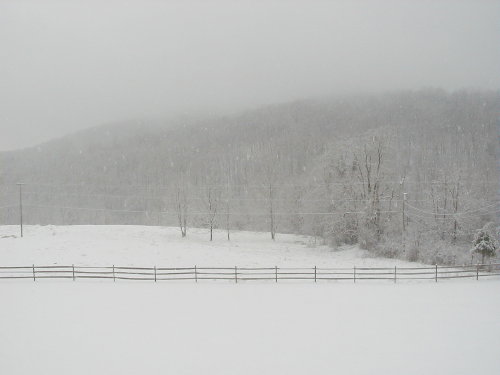

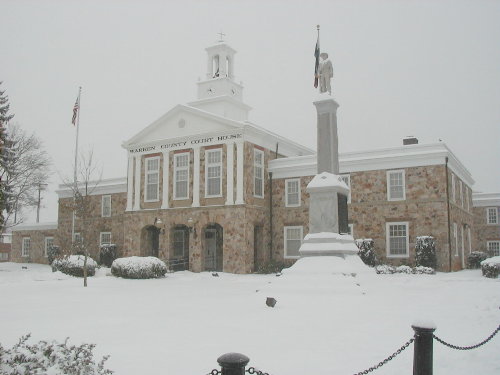
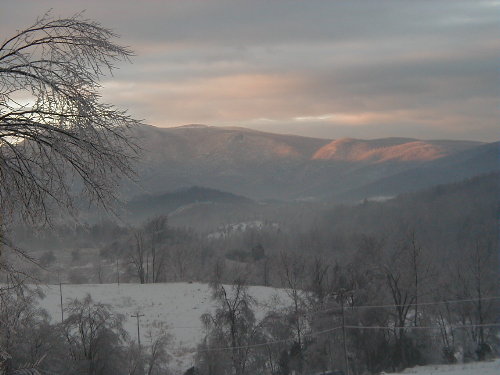
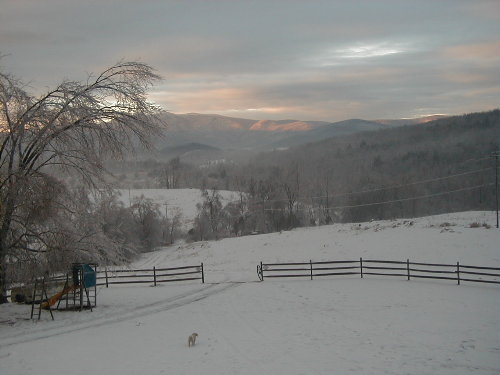
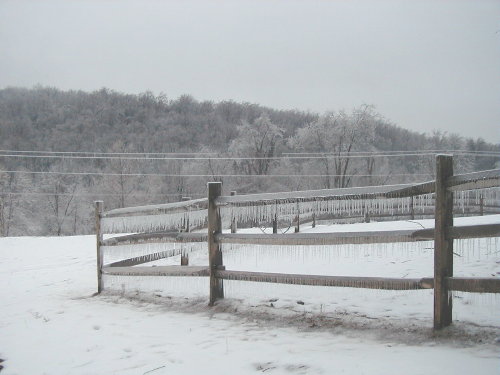
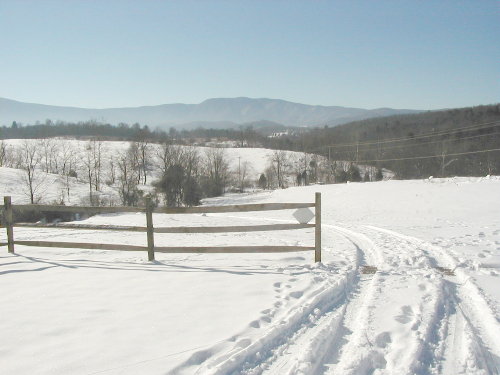
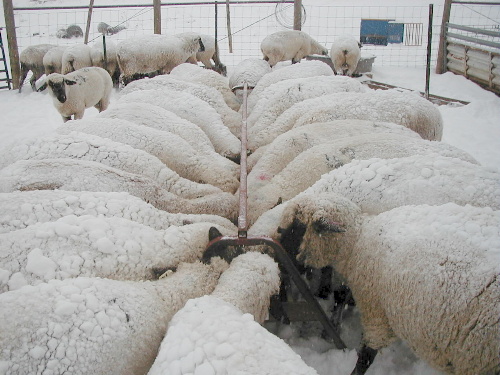
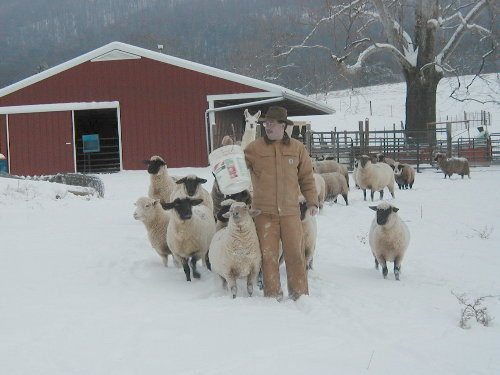
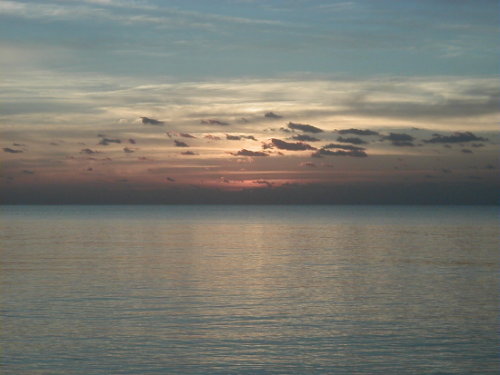

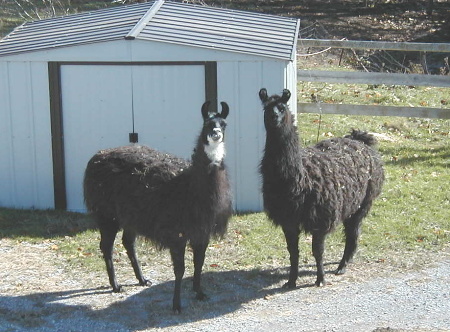
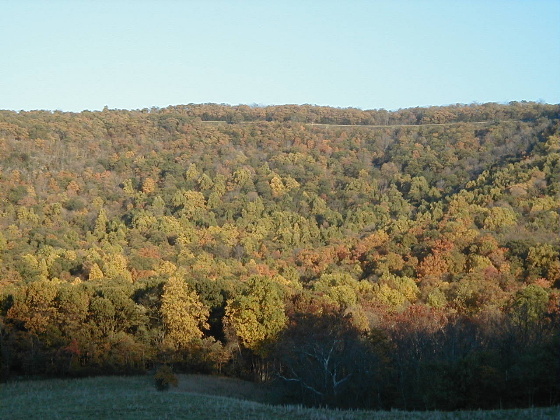
 In an entry on the LiveJournal for Orthodox Christianity, Bishop Seraphim Sigrist asks about what icon touches you. By way of an answer to that question I present the clumsily photographed image on the left, an icon made by a friend of a friend. Before becoming Orthodox, I met a Russian couple, Mark and Lena Khaisman, then living in Front Royal. Mark was working as a stained glass designer for a local studio, but had trained in Russia as an iconographer. I had seen icons before, under glass from a distance at museums, or as prints in books. When I saw his works for the first time, held them, really looked at them, there was a quality I had never before imagined. It is a cliche these days to call icons "windows to heaven." I did not see heaven, but when I looked through these "windows", there were depths that looked back, judging, and comforting. It was the kind of encounter with the Spirit I thought possible only in prayer and reading the Scriptures. This was unexpected to say the least. In my mind icons were simply another form of religious art, instructive when used properly, idolatrous when abused, but totally understandable within my Anglican/evangelical world view. Standing before Mark's icons I felt like a wading pool swimmer shown the ocean for the first time. To my regret, I never purchased one of his before he and Lena left Front Royal for Philadelphia. My wife Susan did buy me as an unexpected present the icon displayed here. It had been carved by a friend of Mark's back in Moscow, blessed, and sent to America in hopes that it would send back some hard currency to help his family survive in the worst days following the Soviet collapse. I had admired it at Mark and Lena's home, and it took my breath away again when I unwrapped it in mine. It would be overstating the case to say that I became Orthodox to make a proper place for this icon in my life, but it would not be a lie either. For the curious, the icon is a bas-relief, carved in wood and lightly lacquered, of the "Vladimir Mother of God." The Orthodox Church in America web pages have a history of the place of the "Vladimir" icon in Russian piety here.
In an entry on the LiveJournal for Orthodox Christianity, Bishop Seraphim Sigrist asks about what icon touches you. By way of an answer to that question I present the clumsily photographed image on the left, an icon made by a friend of a friend. Before becoming Orthodox, I met a Russian couple, Mark and Lena Khaisman, then living in Front Royal. Mark was working as a stained glass designer for a local studio, but had trained in Russia as an iconographer. I had seen icons before, under glass from a distance at museums, or as prints in books. When I saw his works for the first time, held them, really looked at them, there was a quality I had never before imagined. It is a cliche these days to call icons "windows to heaven." I did not see heaven, but when I looked through these "windows", there were depths that looked back, judging, and comforting. It was the kind of encounter with the Spirit I thought possible only in prayer and reading the Scriptures. This was unexpected to say the least. In my mind icons were simply another form of religious art, instructive when used properly, idolatrous when abused, but totally understandable within my Anglican/evangelical world view. Standing before Mark's icons I felt like a wading pool swimmer shown the ocean for the first time. To my regret, I never purchased one of his before he and Lena left Front Royal for Philadelphia. My wife Susan did buy me as an unexpected present the icon displayed here. It had been carved by a friend of Mark's back in Moscow, blessed, and sent to America in hopes that it would send back some hard currency to help his family survive in the worst days following the Soviet collapse. I had admired it at Mark and Lena's home, and it took my breath away again when I unwrapped it in mine. It would be overstating the case to say that I became Orthodox to make a proper place for this icon in my life, but it would not be a lie either. For the curious, the icon is a bas-relief, carved in wood and lightly lacquered, of the "Vladimir Mother of God." The Orthodox Church in America web pages have a history of the place of the "Vladimir" icon in Russian piety here.


